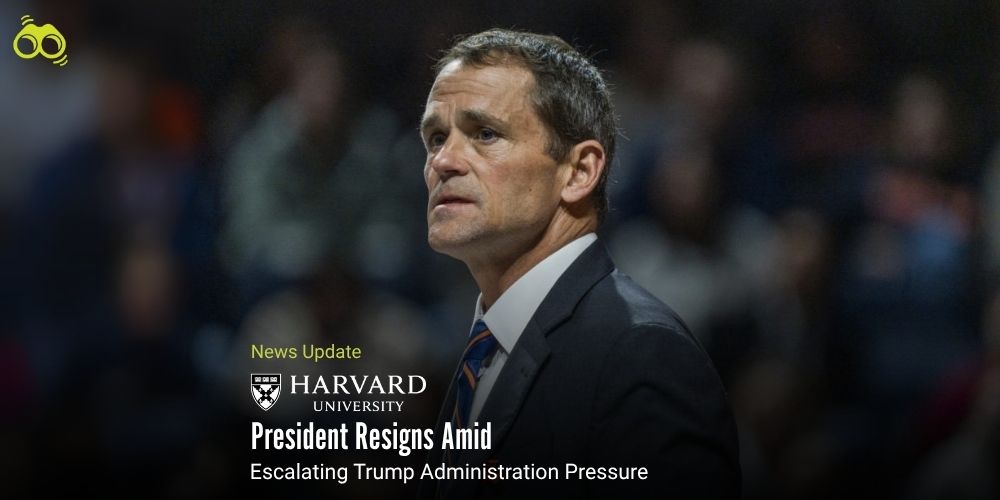UVA Shake-Up Reflects Wider Tensions Between Academia and Federal Policy
Ryan’s Resignation Signals Growing Federal Influence in Higher Education
James Ryan, President of the University of Virginia (UVA), has reportedly resigned amid mounting pressure from the U.S. Department of Justice (DOJ), which has been scrutinising the university’s diversity, equity, and inclusion (DEI) policies. Ryan, who had served in the role since 2018, was allegedly criticised for not fully complying with federal directives to dismantle DEI initiatives.
In an email addressed to the university community and widely shared on social media, Ryan stated that his decision to resign was intended to shield UVA from possible federal retaliation. He explained that challenging the government to retain his role would appear self-serving, especially if it risked staff layoffs, the withdrawal of research funding, or jeopardised students’ financial aid and visa status. The university’s board has accepted his resignation, though a timeline for his departure has not been confirmed. This development is being seen as part of the Trump administration’s broader campaign to reshape higher education, particularly targeting institutions perceived as liberal. During his second term, President Donald Trump has reportedly escalated efforts to dismantle diversity programmes, crack down on pro-Palestinian student protesters, and scrutinise university admissions and hiring practices.
Observers have noted that Ryan’s resignation may signal a shift in federal scrutiny from elite private institutions such as Harvard University to major public universities. Just a day before Ryan stepped down, the DOJ reportedly launched an investigation into the University of California over its diversity standards. Ted Mitchell, President of the American Council on Education, condemned the pressure leading to Ryan’s resignation, describing it as “thuggery instead of rational discourse” and calling it a “dark day” for higher education. He warned that the federal government appears determined to assert control over universities.
Similarly, Virginia’s Democratic senators, Mark Warner and Tim Kaine, strongly criticised the DOJ’s alleged role in pushing for Ryan’s resignation. They described it as an outrageous attempt to impose “culture war” politics on the state’s educational system and cautioned that such interference could endanger Virginia’s academic future.
Although the University of Virginia had already started to scale back its DEI programmes, including the closure of its DEI office and revisions to related policies on admissions, hiring, and financial aid, critics argued these changes were superficial. Republican Governor Glenn Youngkin welcomed the move, declaring, “DEI is done at the University of Virginia.”
However, America First Legal, a conservative group founded by former Trump adviser Stephen Miller, claimed the university merely rebranded its existing DEI infrastructure. In a letter to the DOJ, the group alleged that UVA continued to operate an “unlawful” system under different names. The group also targeted Ryan personally, citing his support for a joint statement by college presidents condemning political interference in academia. Following his resignation, America First Legal lawyer Megan Redshaw asserted that public universities receiving federal funds must respect constitutional boundaries, arguing that they cannot impose ideological litmus tests, enforce race- or sex-based preferences, or disregard executive authority.
This federal campaign mirrors earlier action taken against Harvard University, where the Trump administration reportedly sought to block international student enrollment, threatened to revoke the university’s tax-exempt status, and cut over $2.6 billion in research grants. While Harvard, with its $53 billion endowment, may weather such pressures, public universities like UVA, with a $10 billion endowment but greater reliance on taxpayer funding, are more vulnerable to political and financial leverage. Ultimately, James Ryan’s resignation underscores the intensifying clash between federal policy and institutional autonomy, reflecting a broader national debate over the role of DEI, academic freedom, and governance in the evolving landscape of American higher education.
Editor’s Note:
The resignation of James Ryan as President of the University of Virginia marks a defining moment in the ongoing tension between federal policy and academic autonomy in the United States. His departure, amid reported pressure from the Department of Justice over the university’s diversity, equity, and inclusion (DEI) policies, signals a shift in how political forces may increasingly influence leadership decisions at public institutions. This incident sparks wider concerns about public university governance, especially given their reliance on federal funding. When external political pressure, not internal review or public accountability, dictates institutional choices, academic autonomy suffers. It forces university leaders to choose between upholding inclusive academic values and ensuring institutional stability amid funding threats or legal action.
Skoobuzz asserts that this resignation serves as a pivotal reminder for all institutions to examine their policies and their core values to determine how best to uphold them amid growing political scrutiny.














0 Comments (Please Login To Continue)